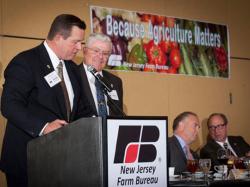NJ Farm Bureau Gears Up For New Year Of Food Production Challenges
November 27, 2013 | 3 min to read

Trenton, NJ – "Because agriculture matters" launched the New Jersey Farm Bureau's 95th annual convention, including debate to help resolve the increasingly complex issues confronting the state's farmers. "Because agriculture matters" was adopted as the organization's new slogan, to be displayed on its newly designed website, facebook and other social media.
A push for more young people in farming leadership positions was initiated at the convention, renewing the Young Farmers & Ranchers program of the American Farm Bureau Federation for farmers ages 18-35. The introductory meeting just prior to the convention attracted 30 young farmers, who were addressed by Zach Hunnicutt, 2013 national chair of YF&R. "Now is the time to invest in the future of New Jersey agriculture," said Hunnicutt, a Nebraska farmer.
Many factors are attracting New Jersey's young people to farming, among them the opportunity to work for oneself and the growing public interest in visiting farms and buying locally grown produce. "Our annual surveys continue to show that agriculture is important in New Jersey," says Ryck Suydam, who opened the convention as its president for the second year. "Not only is it a major revenue producer, amounting to more than $1-billion annually, but its value goes well beyond economics to most people."
The Farm Bureau's pre-convention survey of public opinion, conducted by Fairleigh Dickinson's PublicMind Poll, showed that the state's residents overwhelmingly support public funding for preservation of farmland and open space. "Both urban and rural dwellers appreciate driving by farms and seeing plowed fields, growing crops, and pastures" says Suydam. "It reminds them that people and land are interdependent. Proof of this came in the poll showing that 77% percent of those surveyed say they purchase locally grown produce, and the majority are willing to pay something extra for it."
Defining "locally grown" was a drawn-out discussion among convention delegates endeavoring to set policies for 2014. While the survey addressed the same question and indicated that 44% of responders said "locally grown" should apply to crops grown within state borders, convention delegates also considered the proposed NJ Department of Agriculture rule proposal defining "locally grown" as crops grown within 30 miles of the state's borders, which would extend to Delaware, Maryland, Pennsylvania, and New York states. Delegates agreed to continue studying the issue, recognizing that New Jersey farms selling wholesale outside state borders must be given consideration.
Tony Broccoli, of Rutgers' Climate Adaptation Alliance, addressed food production and climate change, noting that June 2013 was the wettest on record and otherwise noted that agriculture falls under the economic sectors at risk from climate change. Jennie Schmidt, a Maryland farmer who has experimented with three different types of crops on her 2100-acres presented her experiences with conventional, organic, and HMO (or bio-tech). While she drew no definitive conclusions, she pointed out the future need to feed an increasing global population. "The public accepts technology in most other areas of our culture, but seems insistent on perceiving farmers and farming as pictured in American Gothic" she said. "Traditional methods won't feed the world. The public must recognize the fact that farming must accept experimentation in production methods and adopt technology to meet this need for food supply in the future."
New Jersey forests also came under scrutiny by Steve Kallesser of Gracie & Harrison Consulting Foresters, who has been working with private woodland owners and the state. He pointed out that nature doesn't manage forests; that must be done by landholders with careful forest management plans. He also commended New Jersey forestland owners for creating and implementing sustainable forest plans.
During his remarks to the convention on November 18th, New Jersey Secretary of Agriculture Douglas Fisher praised the state's farmers and the New Jersey Farm Bureau for efforts to utilize "best practices" and conservation in their farming practices.
The New Jersey Farm Bureau is a non-profit member organization of 11,000+ farmers and farm-related individuals within the Garden State. It is the only organization solely dedicated to representing the grass- roots interests and directives of its members in educating all levels of government and the public on the farm community’s policies and positions. The Farm Bureau also takes a lead in seeking out initiatives, activities and ventures to enhance the profitability of producer members and ensure the viability of farming in New Jersey – Because Agriculture Matters
Source: New Jersey Farm Bureau
